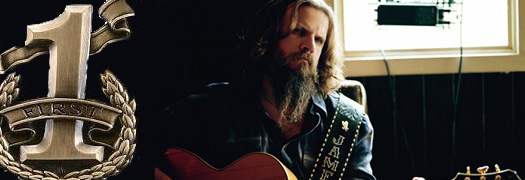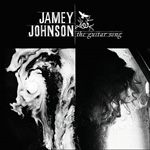
Features | Awards
The "All Things Considered Shouldn’t Mean All Things Considered" Award for the Danger Involved in Being Blindly Open-Minded
By Eric Sams | 10 December 2010
 Jamey Johnson.
Jamey Johnson.
The Guitar Song
(BNA/Mercury Nashville; 2010)
Boy howdy, did NPR lie to me about Jamey Johnson. In my nightly drive-home dalliance with All Things Considered they painted him as some sort of country music roots revivalist whose recent album, The Guitar Song, swung the focus of that genre’s trademark mournful meditations and honky tonk dust-ups onto an urban landscape. “It’s about New York City,” they said, in a away that implied that there was some line-blurring going on with Jamey Johnson, that he was Merle Haggard meets, y’know, somebody else.
I guess I missed the part where he’s an ex-marine from Alabama whose debut album contained songs entitled “Rebelicious” and “Redneck Side of Me.” So, no, Jamie Johnson’s not spanning any genre borders or offering a new interpretation of country. He’s just offering country. And he’s offering it by the shitload. The Guitar Song is a 25-song double disc country music album. It’d take me an hour on Amazon to find even five of those. It’s definitely this voluminous ambition that landed his third record a spot on ATC. Well, that and the fact that the tenets of NPRs hippie liberal eclecticism mandate that they meet their monthly “shit our listeners, at the very least, don’t care about” quota.
I blame a little of it on the Avett Brothers too, them and their ilk. Ever since Whiskeytown indie bands have been running around donning cowboy boots and head-sized belt buckles and crowing about the reclamation of a country tradition. Alt-country, as it was earlier this decade, and its increasingly ironic descendants are simply a gigantic misnomer. Almost without exception these acts play bluegrass tinged folk. And it seems that this misunderstanding stems mostly from the fact that, just like indie, no one really knows what “country” means anymore. Unlike the broad diffusion of the word “indie,” however, I don’t give a shit about that, NPR.
See, I love the Avett Brothers, but I’ve long since come to learn that this gives me no right to go around telling people that I like “some country music.” That’s not what that means. I don’t get a claim on that designation. I once threw on Wilco and told a girl I was working with that she may like it because it was “country-ish.” I mean, Americana does share some musical roots and aesthetic vestiges with actual country music. When Jeff Tweedy started singing she looked at me like I was a child, calmly walked to the CD changer, and began to play George Strait’s “All My Exes Live in Texas.” The contrast was immediate and unmistakable. It was about as eloquent an argument as one could put forth in that situation, and it can be reduced thusly: “Kindly fuck off with your hipster equivocation.”
And it works the other way, too. If I’m not allowed to redefine country music to fit my tastes (and I shouldn’t be), then don’t come bringing me some bona fide country album, let alone a double shot, and tell me to give it a spin on the off chance that I may just give a good fuck. If it’s country, I won’t like it. If I like it, it won’t be country. The twain shall never meet. This comes from the simple truth that, even though no one really knows what country is anymore, only its practitioners and fans should get a shot at even trying to define it.
And they have. And the definition is one part Sugarland and two parts Toby Keith. And the definition sucks.
It should be noted that this wasn’t always true of country music, only the way its come to be defined in the past 20 years. Because Jamey Johnson claims to be, and sort of is, a traditionalist. He’s just a traditionalist filtered through the lens of all the cultural and sociopolitical bullshit that has become caked to the sole of country music’s Larry Mahans over the previous few decades. And, yes, I got that reference from No Country for Old Men. See what I mean?
The challenge of a good traditionalist is to realize the vision in his head while allowing his predecessors to choose the medium by which he expresses it. There’s a daring quality to plunging headfirst into something with its rules and boundaries so clearly defined and trying to clear out a little corner for yourself. It’s trying to find your stride while riding piggyback. But the other side of the traditionalist coin is a sort of anti-Darwinian dogged adherence to shitty conventions that should have been long since sloughed off like dead skin.
Especially now, with all that pandering to a nameless, nebulous, self-interested, and ultimately idiotic anger currently marauding through America in the tissue-thin disguise of a movement. I don’t know why a musical tradition as rich in artistic quality as any other seems now to be mostly, or perhaps only, a vehicle for hackneyed class warfare, but I’d like to emphatically repeat that I, as a non-fan, don’t get a say in deciding what country is or isn’t. I only get to choose whether I accept it or not.
Realizing that and sticking to it is what refining your tastes is all about. Sometimes eclecticism is a cop out. Sometimes it’s a weak soup justification for not having any tastes. And sometimes, when it’s done for its own sake, it’s just a huge fucking hassle. We all know that guy or girl that has a few token bands from every genre just so they can’t possibly be left out of the conversation at a party. (OMG, you guys, Har Mar Superstar!!) You won’t be thanked for pubbing this album to people with the courage not to care, Robert Siegel. You won’t be thanked by Johnson, nor by country fans, nor by your listeners, and certainly not by me, who’s now a few precious hours older after blindly putting myself through the Jamey Johnson exercise.





